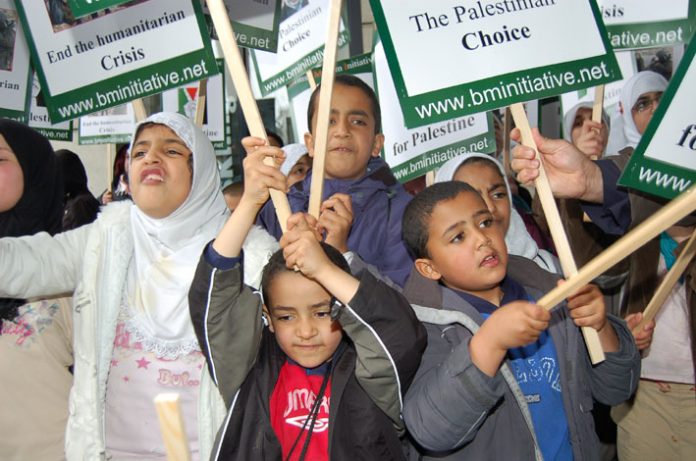
THE Hamas and Fatah Palestinian factions have held their fire in the first few hours of a truce that took effect yesterday afternoon in the Gaza Strip.
Egyptian mediators helped Hamas and Fatah leaders reach the deal after five days of fighting that left more than 30 people dead.
Under the terms of the cease-fire, both sides have agreed to take all fighters off the streets of Gaza, remove checkpoints and hand over to prosecutors those suspected of involvement in the killings.
Ahmed Yousef, a senior political adviser to Palestine’s Hamas Prime Minister, says both sides want the agreement to succeed.
‘We hope that we will find the situation becalmed and a lot of effort from different Palestinian parties to make sure that everybody will abide by this agreement,’ he said.
The cease-fire deal was announced by Hamas Foreign Minister Mahmoud Zahar.
He stood flanked by Fatah representatives, and the Egyptian diplomatic mediators who brokered the truce were also present.
Zahar called for the release of all hostages who were seized by the factions during the fighting.
Israel has taken advantage of the inter-Palestinian fighting to bomb an alleged Gaza Strip border tunnel into Israel.
‘Palestinians were preparing to use it to commit an attack in Israel,’ an Israeli military spokesman said of the tunnel.
The tunnel is located near the Karni border post, which is the main crossing point for goods traffic between Israel and the Gaza Strip.
The strike was carried out after a suicide bombing in the Red Sea resort of Eilat.
It was the first air strike in the Gaza Strip since a November 26 truce, when Israel halted offensive operations after Palestinian militant groups agreed to halt the firing of makeshift rockets into Israel.
After the bombing, Israeli Prime Minister Ehud Olmert vowed to continue a ‘battle without respite against the terrorists and their commanders’.
Earlier Mahmoud al-Zahar had read out a joint ceasefire statement by the two sides.
He said that ‘The president and the prime minister call on Hamas and Fatah to abide by the above mentioned agreement and to meet immediately to discuss all the remaining issues in preparation to resume the broad national meeting over the formation of a national unity government,’ al-Zahar said.
Palestinian factions earlier clashed again in Gaza despite agreeing to participate in Saudi-mediated talks to end the worst bout of internecine violence in a year.
Thirty people have been killed and more than 100 others wounded in four days of fighting.
Gun battles between Hamas and Fatah raged throughout the night on Monday across the territory, where three people were killed in the southern town of Khan Younis and two others in Gaza City, medics said.
Saudi Arabia’s King Abdullah bin Abdulaziz Al-Saud offered on Sunday to hold talks in Mecca to stop the ‘disgraceful’ fighting, a proposal welcomed by faction leaders.
Abdullah said: ‘I invite my brothers of the Palestinian people, represented by their leaders to a quick meeting in their brotherly homeland Saudi Arabia to discuss their differences without any intervention from outside parties,’ he said in an appeal carried by the state news agency SPA.
Khaled Meshaal, the ruling Hamas movement’s political chief, and Mahmoud Abbas, the Palestinian president, both welcomed the offer, though no date for the meeting has yet been announced.
Several previous efforts to end the feuding, including a rare meeting between Meshaal and Abbas in Damascus, had proved fruitless.
The killings and tit-for-tat abductions continued in both the Gaza Strip and the occupied West Bank.
Anti-tank rockets and mortar shells were also fired at Fatah’s police headquarters.
Also on Sunday, Fatah supporters, many of them masked, set ablaze the Nablus offices of the Hamas-controlled education ministry and abducted 11 Hamas members.
Hamas fighters in turn seized Shabn Abu Assar, the chief of the Palestinian security forces for Gaza, but released him after two hours.
Among the victims were an 11-year-old boy caught in the crossfire on Saturday night and a two-year-old child killed by a stray bullet during a firefight in Khan Younis on Friday.
Throughout Gaza, the warring factions had set up roadblocks and continued to trade bursts of machinegun fire, and anti-rocket and mortar shells.
The territory has become deserted, with shopkeepers boarding up shops and staying in the relative safety of their homes.
Hamas had called on Abbas, who is outside the territory, to return home immediately to help put an end to the bloodshed.
The Arab League had condemned the fighting as "irrational and unacceptable" and Alvaro de Soto, the UN special co-ordinator for the Middle East peace process, called on all parties ‘to cease clashes’.
The source of the struggle is the refusal of the US and the UK to recognise the democratically elected Hamas government and their attempt to bring it down through an economic and financial blockade which has seen the Palestinian people go starving.
The imperialist powers and Israel have encouraged the Fatah movement to take advantage of the distress that the blockade has caused and to bring down the Hamas government.
The late Yasser Arafat in his years of rule, whatever the critical nature of the situation always adopted measures that would assure Palestinian unity, even when he was imprisoned for years in his Ramallah headquarters.